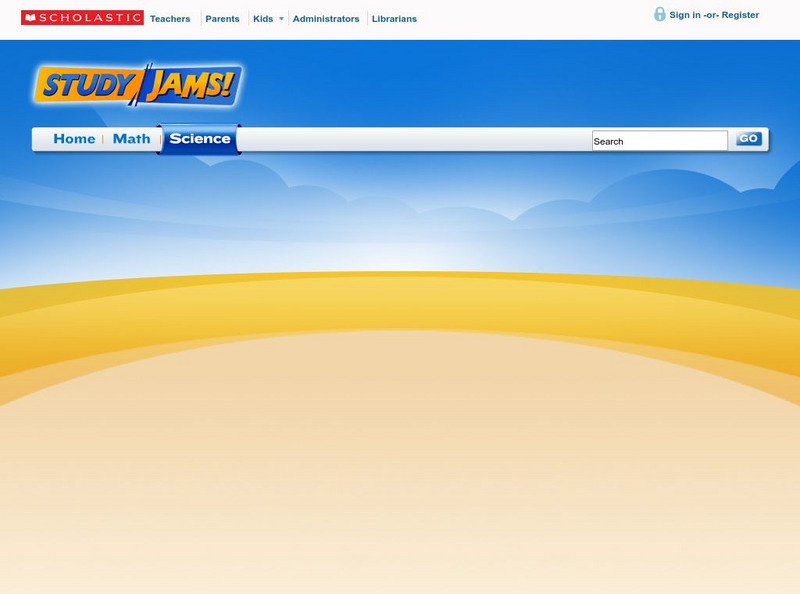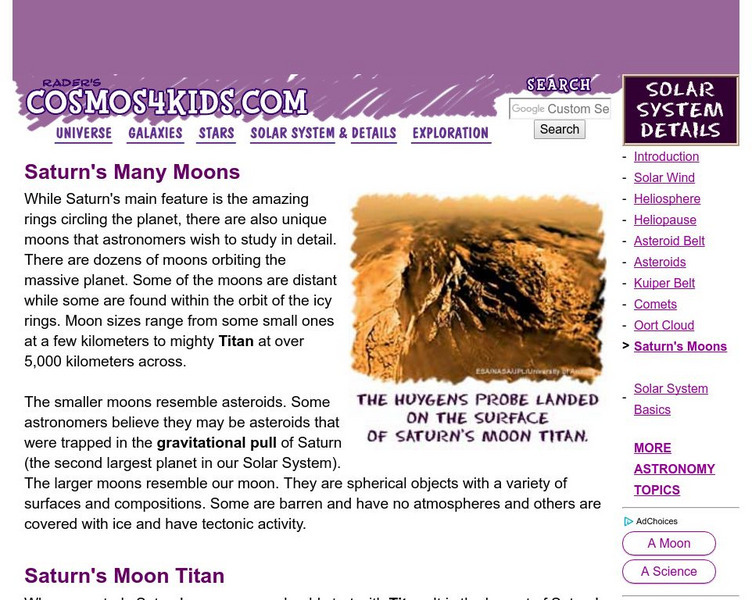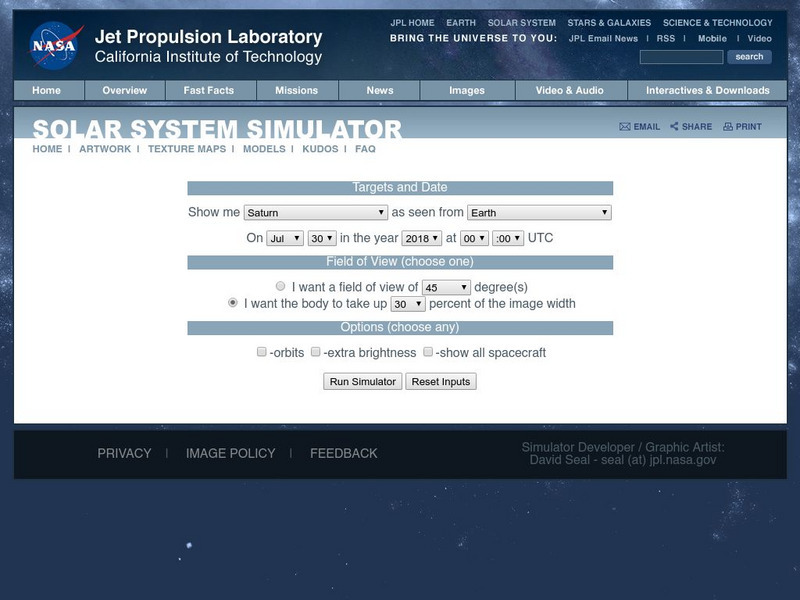Hi, what do you want to do?
Scholastic
Scholastic: Study Jams! Science: Our Solar System: Outer Planets
A slideshow and a short multiple-choice quiz on the four outer planets of our solar system, which include Jupiter, Saturn, Uranus, and Neptune.
California Institute of Technology
Spitzer Science Center: Historias Desde Espacio: Premiacion a Las Planetas
All the planets are competing to see who is the best planet in the Solar System. Read the story in Spanish to learn the results of the pageant. Excellent source of information presented in a fun manner.
Other
Montana State University: How Much Would You Weigh on Distant Planets?
This resource contains a lesson plan in which young scholars study the effects of gravity on the planets of the Solar System. They will view movies from the lunar Apollo missions, calculate their own weight on other planets, and propose...
Other
The Apollo Society: The Solar System
Contains a small set of images of solar system objects and a series of links to information about all solar system objects. Solar System Tours link to excellent image collections.
NASA
Nasa: Our Solar System Lithograph Set
View a lithograph set that includes pictures and brief descriptions of planets, sun, asteroids, comets, meteors, and meteorites. While viewing the lithograph learn important dates and interesting facts about our solar system.
University of Texas at Austin
The University of Texas Mc Donald Observatory: Jupiter
Discover interesting facts about Jupiter, the largest planet in the solar system.
University of Texas at Austin
The University of Texas Mc Donald Observatory: Saturn
Discover interesting facts about Saturn, the second-largest planet in the Solar System.
University of Texas at Austin
The University of Texas Mc Donald Observatory: Rock Cycle
This activity combines the concept of Earth's rock cycle with the characteristics of other planets in the solar system.
Other
Simple Science: Planetary Gallery
The innovative resource examines images of the Sun, Moon, Pluto, and all eight planets in the Solar System. Learners calculate the diameter of each object and rank the objects in order of size. The activity has an interactive online...
Cosmos 4 kids
Cosmos4 Kids: Solar System Details: Moons of Saturn
Explore the dozens of Saturn's moons orbiting the second largest planet of our solar system. Find out about the Cassini space mission which explored Saturn's largest moon, Titan.
University of California
At Home Astronomy: Hands on Science Experiments for the Entire Family
A collection of ten hands-on science experiments for the entire family that will help you understand concepts in astronomy. Make an astrolabe, find the size of the sun and moon, build a lunar settlement, find out about meteoroids, shadow...
Texas Instruments
Texas Instruments: Solar System
This activity is designed to assess the comprehension of concepts related to the planets and other astronomical bodies in the Solar System.
Enchanted Learning
Enchanted Learning: Zoom Astronomy: All About Space
A fantastic collection of information about the solar system. Includes information on all of the planets, the moon, the sun, asteroids, comets, meteoroids, and stars. Also find puzzles, a dictionary, quizzes, classroom activities, and...
NASA
Nasa: Surface Maps of the Solar System
Solar system surface map database. Includes maps of all solid planets and many moons. Maps of gas planets are either based on images taken by Voyager, or are fictitious maps including general storm systems.
Cosmos 4 kids
Cosmos4 Kids: Solar System Details: Kuiper Belt
Explore space beyond Pluto in the Kuiper Belt region of our solar system. Find out about the space bodies that exist there and what our space missions have taught us about this far away region.
ClassFlow
Class Flow: Linking You to Our Solar System
[Free Registration/Login Required] Single flipchart page with links to many of the Solar Systems heavenly Bodies. The links allow you to collect Solar system cards from a wonderful website.
PBS
Pbs Learning Media: All Planet Sizes
This illustration from the Lunar and Planetary Laboratory shows the approximate sizes of the planets relative to each other. Note that the planets are not shown at appropriate distances from the Sun.
Sophia Learning
Sophia: Space Sciences: Introduction to the Mars Science Laboratory
Created to teach students of the 21st century, SOPHIA is bringing Mars straight to your fingertips. Discover what scientific discoveries are occurring in the rest of the universe with this interactive tutorial.
University of Texas at Austin
The University of Texas Mc Donald Observatory: Solar System Science
Each student becomes the "ambassador" for a planet and prepares by researching their planet, then meets with other ambassadors to form new mini-solar systems.
CK-12 Foundation
Ck 12: Earth Science: Inner Versus Outer Planets Study Guide
An overview of the difference between inner and outer planets of our solar system.
NASA
Nasa: Astronomy Picture of the Day: Titania, Uranus's Largest Moon
A brief overview of Titania, Uranus's largest moon. Includes a very good description of the moon's surface. A NASA picture of the day.
NASA
Nasa: Astronomy Picture of the Day: Uranus's Moon Umbriel
Brief overview of Umbriel from NASA. Answers the question "why is the moon so dark"? Provides additional links for more information. A NASA picture of the day.
National Geographic
National Geographic: Educator Resources: Extreme Weather on Other Planets
Find lesson plans, worksheets, photo galleries, and related links for teaching about the weather systems of planets in our solar system.
American Museum of Natural History
American Museum of Natural History: Ology: Astronomy: In Pictures: Beyond Planet Earth
What would it be like to travel across the solar system and explore space? Take a look at some of the places that humans might go to someday, and the questions that scientists are asking.





















